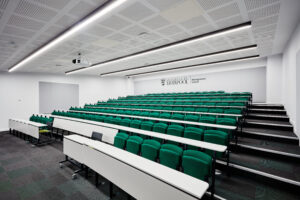How you'll learn
MBA students are taught in a dedicated, purpose-built teaching space, the Brett Building. Its facilities include state-of-the-art audio-visual equipment, a lecture theatre, break-out spaces, and social zones.
Delivery of the programme syllabus is via lectures, practical work, case studies, group work, some tutorial work, seminars (for optional modules), and occasional industrial and commercial visits. Lectures provide the principal approach to imparting subject knowledge and, with group activities, constitute most of the formal contact time with students.
In addition, a concerted effort has been made to include a significant amount of case-study material and practical work in order to demonstrate the application of principles and theories delivered within the main lecture programme. The practical elements of the programme take the form of both team-based and individual or self-directed exercises.
How you're assessed
You will take six modules totalling 60 credits. These will be assessed by means of examination and/or coursework.
Liverpool Hallmarks
We have a distinctive approach to education, the Liverpool Curriculum Framework, which focuses on research-connected teaching, active learning, and authentic assessment to ensure our students graduate as digitally fluent and confident global citizens.
The Liverpool Curriculum framework sets out our distinctive approach to education. Our teaching staff support our students to develop academic knowledge, skills, and understanding alongside our graduate attributes:
- Digital fluency
- Confidence
- Global citizenship
Our curriculum is characterised by the three Liverpool Hallmarks:
- Research-connected teaching
- Active learning
- Authentic assessment
All this is underpinned by our core value of inclusivity and commitment to providing a curriculum that is accessible to all students.











